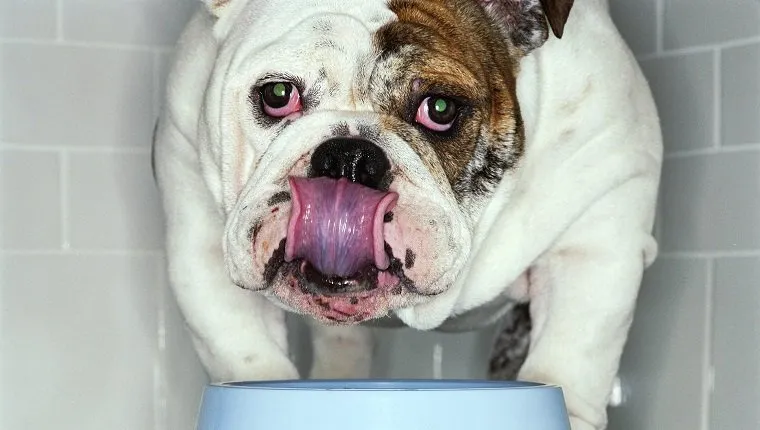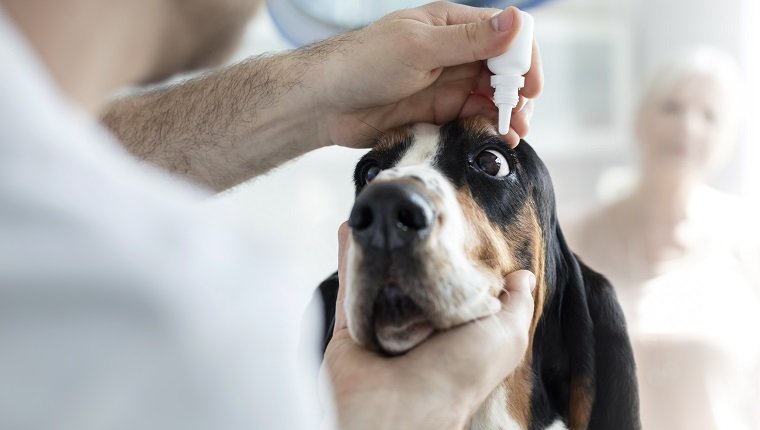Desmopressin for dogs, also known by the brand names DDAVP and Stimate, is a drug primarily used to treat central diabetes insipidus.
It’s a synthetic replacement for vasopressin, also known as antidiuretic hormone or ADH, which is a hormone produced by a dog’s pituitary gland that helps regulate urine production by the kidneys and the amount of water that the body retains.
Desmopressin is one of the most common drugs veterinarians use to treat diabetes insipidus. Though the FDA has not approved it for veterinary use, vets can prescribe it safely and legally. The drug is only available through a prescription. If your vet prescribes it for your dog, follow their instructions closely.
Here’s what you should know about the uses, dosage, and side effects of desmopressin for dogs.
Uses Of Desmopressin For Dogs

Desmopressin for dogs is primarily used to treat central diabetes insipidus, a condition where dogs’ pituitary glands don’t release enough vasopressin, the antidiuretic hormone. The body is unable to retain appropriate amounts of water, which can result in excessive thirst, drinking, and urination, as well as weight loss and dehydration in dogs.
Desmopressin is a synthetic form of vasopressin. It replaces the hormone to help regulate the kidneys and control the amount of water the body retains.
A secondary effect of the drug is that it can cause a short-term increase in blood clotting. For this reason, vets sometimes prescribe it to treat von Willebrand’s disease, a genetic disorder that prevents blood from clotting.
Dosage Of Desmopressin For Dogs

The following is a guideline for typical use of the drug in dogs and must not replace your veterinarian’s advice for your individual pet.
The usual dosage of desmopressin for dogs with central diabetes insipidus is 1 to 2 drops administered to the eyes or nostrils twice a day.
The drug is available in tablet form, though it’s less common for dogs to take it orally. Vets most often prescribe it in the form of a 10 microgram solution that can you can administer nasally or through the eyes.
Desmopressin also comes in an injectable form, which dogs should take in doses of 1 to 2 micrograms per dog for central diabetes insipidus or 0.5 micrograms per pound of body weight for dogs with von Willebrand’s disease. The treatment for von Willebrand’s disease lasts for about four hours.
It’s important that you continue administering the drug for the full duration of your vet’s prescription. Don’t stop giving your dog the medication, even if symptoms improve, unless your vet instructs you to stop.
Side Effects Of Desmopressin For Dogs

Side effects of desmopressin for dogs are uncommon, and the drug is usually safe and effective when prescribed by a veterinarian. There are, however, some uncommon side effects that may appear.
If these side effects become concerning, then you should consult your vet. They may wish to alter the dosage or seek an alternative form of treatment.
Here are some of the side effects that dogs who take desmopressin may experience:
- Eye irritation
- Fluid retention
Make sure your vet is aware of any other medical conditions your dog has, as well as any medication they may be taking, especially epinephrine, heparin, and fludtrocortisone, as these may interact poorly with desmopressin.
As with almost all medications, there’s a risk of allergic reaction that can lead to anaphylaxis, a potentially deadly condition. If you see signs of an allergic reaction, including swelling, difficulty breathing, hives, or other symptoms, contact your vet immediately.
Has your dog ever taken desmopressin? Did it help their condition? Let us know in the comments below!









